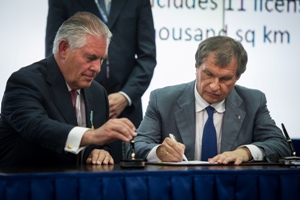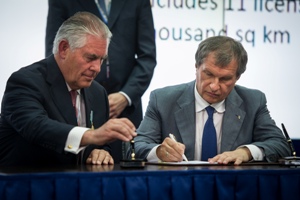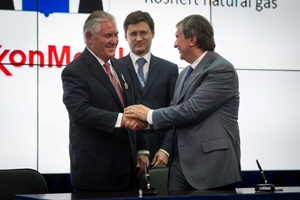Rosneft and ExxonMobil Advance Strategic Cooperation


- Completed formation of joint ventures framework for Kara Sea and Black Sea projects
- Finalized agreements on seven Arctic license areas in the Chukchi, Laptev and Kara seas
- Establishing foundation for joint venture to implement West Siberia tight oil pilot project
- Moving to next study phase for LNG project in Russian Far East
ST. PETERSBURG, Russia – Rosneft and ExxonMobil today announced the achievement of several milestones under their 2011 Strategic Cooperation Agreement, including joint venture formation for the Kara Sea and Black Sea projects, and establishing foundations for joint ventures to explore seven other licenses in the Russian Arctic and to manage the joint West Siberia tight oil project. The companies have also agreed to move to the next study phase for an LNG development in the Russian Far East.
Agreements were signed today at the St. Petersburg International Economic Forum by Igor I. Sechin, Rosneft president and chairman of the Management Board, and Rex W. Tillerson, chairman and CEO of Exxon Mobil Corporation.
The Black Sea and Kara Sea joint venture operating companies, Tuapsemorneftegaz SARL and Karmorneftegaz SARL respectively, will commence project implementation activities as operator pursuant to agreement with Rosneft, which is the license holder. Rosneft holds 66.67 percent interest and ExxonMobil holds 33.33 percent interest in the two projects. The initial cost of exploration in the two areas is estimated at more than US $3.2 billion, the majority of which will be financed by ExxonMobil. In 2013 collection of data for both regions will continue until the commencement of drilling operations in the Kara and Black seas in 2014.
 In February, ExxonMobil and Rosneft announced plans to increase the scope of their strategic cooperation by adding seven new blocks in the Russian Arctic in the Chukchi Sea, Laptev Sea and Kara Sea, spanning approximately 600,000 square kilometers (150 million acres). Rosneft and ExxonMobil have entered into agreements that lay the foundation for joint venture entities for these areas. Data acquisition is being planned for these blocks, which represent some of the most promising and least explored offshore areas globally. The license obligations stipulate that 14 exploration and appraisal wells will be drilled and a significant amount of 2D and 3D seismic will be conducted over the next 10 years.
In February, ExxonMobil and Rosneft announced plans to increase the scope of their strategic cooperation by adding seven new blocks in the Russian Arctic in the Chukchi Sea, Laptev Sea and Kara Sea, spanning approximately 600,000 square kilometers (150 million acres). Rosneft and ExxonMobil have entered into agreements that lay the foundation for joint venture entities for these areas. Data acquisition is being planned for these blocks, which represent some of the most promising and least explored offshore areas globally. The license obligations stipulate that 14 exploration and appraisal wells will be drilled and a significant amount of 2D and 3D seismic will be conducted over the next 10 years.
Agreements are also now in place establishing the foundation for a new joint venture for a tight oil pilot project in West Siberia, where data collection operations are currently underway. Rosneft will hold 51 percent interest and ExxonMobil will hold 49 percent interest in this project.
Also is place is an agreement identifying further steps for the development of a LNG plant in the Russian Far East. Following the agreement, by the end of 2013 the parties will undertake work to determine an LNG plant site, gas liquefaction technologies and commercial structure of the project. Once this work is finalized, the parties plan to progress engineering definition.
Commenting on the agreements signed, Igor Sechin said, “I am glad to note the activities outlined in the Strategic Cooperation Agreement are being implemented ahead of schedule. I would like to thank the teams from both companies for their hard and coordinated work. Our cooperation touches upon the most promising aspects of today’s oil and gas industry: Arctic shelf and deep water areas in the Black Sea covering a total area of 773,000 square kilometers, tight oil in West Siberia as well as a promising LNG project in the Russian Far East. We are convinced that implementation of all these projects will benefit both companies’ shareholders. We believe it will also boost the development of the Russian oil and gas industry and will have a multiplying effect on related industries, already creating market demand for equipment, knowledge and technologies.”
“ExxonMobil is making a significant investment in Russia, and these agreements serve as the foundation for our projects and future work together,” Tillerson said. “Experience tells us that a good foundation is critical for success in the Arctic and elsewhere. ExxonMobil’s Sakhalin-1 project with Rosneft is an example where we have put this experience to work.”
Additionally, on June 11, 2013 Rosneft and ExxonMobil signed agreements regarding the creation of the Arctic Research Center and the joint use of technologies in different regions of the world. ExxonMobil will provide funding for the initial research phase of the Arctic Research Center in the amount of $200 million. Rosneft and ExxonMobil will equally fund the next $250 million to continue their joint research work. The partners’ interests are Rosneft 66.67 percent and ExxonMobil 33.33 percent. The Arctic Research Center will build on current best practices of Rosneft and ExxonMobil to create more environmentally safe and efficient technologies.
Rosneft Information Division
Tel.: + 7 (499) 517-88-97
www.rosneft.com
June 21, 2013
These materials contain statements about future events and expectations that are forward-looking in nature. Any statement in these materials that is not a statement of historical fact is a forward-looking statement that involves known and unknown risks, uncertainties and other factors which may cause actual results, performance or achievements expressed or implied by such forward-looking statements to differ. We assume no obligations to update the forward-looking statements contained herein to reflect actual results, changes in assumptions or changes in factors affecting these statements.